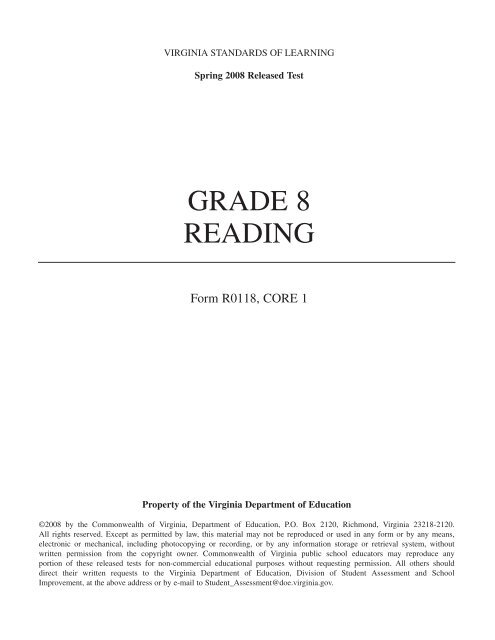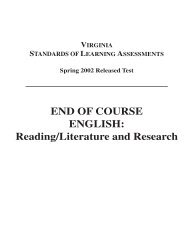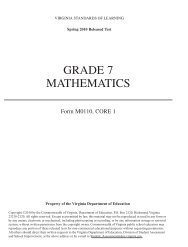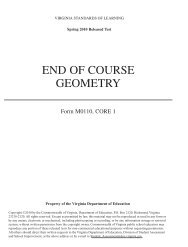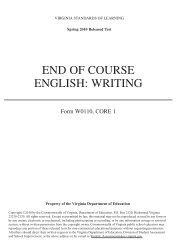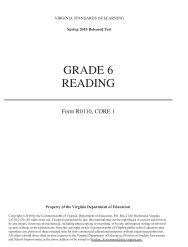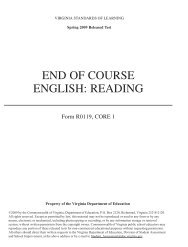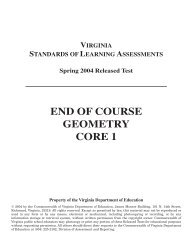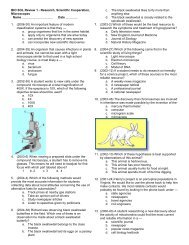Spring 2008 Grade 8 Reading - Virginia Department of Education ...
Spring 2008 Grade 8 Reading - Virginia Department of Education ...
Spring 2008 Grade 8 Reading - Virginia Department of Education ...
You also want an ePaper? Increase the reach of your titles
YUMPU automatically turns print PDFs into web optimized ePapers that Google loves.
VIRGINIA STANDARDS OF LEARNING<br />
<strong>Spring</strong> <strong>2008</strong> Released Test<br />
GRADE 8<br />
READING<br />
Form R0118, CORE 1<br />
Property <strong>of</strong> the <strong>Virginia</strong> <strong>Department</strong> <strong>of</strong> <strong>Education</strong><br />
©<strong>2008</strong> by the Commonwealth <strong>of</strong> <strong>Virginia</strong>, <strong>Department</strong> <strong>of</strong> <strong>Education</strong>, P.O. Box 2120, Richmond, <strong>Virginia</strong> 23218-2120.<br />
All rights reserved. Except as permitted by law, this material may not be reproduced or used in any form or by any means,<br />
electronic or mechanical, including photocopying or recording, or by any information storage or retrieval system, without<br />
written permission from the copyright owner. Commonwealth <strong>of</strong> <strong>Virginia</strong> public school educators may reproduce any<br />
portion <strong>of</strong> these released tests for non-commercial educational purposes without requesting permission. All others should<br />
direct their written requests to the <strong>Virginia</strong> <strong>Department</strong> <strong>of</strong> <strong>Education</strong>, Division <strong>of</strong> Student Assessment and School<br />
Improvement, at the above address or by e-mail to Student_Assessment@doe.virginia.gov.
<strong>Reading</strong><br />
Directions<br />
Read the passage. Then read each question about the passage and choose the best answer.<br />
Fill in the circle on your answer document for the answer you have chosen.<br />
SAMPLE A<br />
Mia’s Art<br />
1 Mia rushed home and threw open the front door. Her mother whirled around, surprised<br />
that Mia was home from school so early. “I won first place in the art contest!” she said<br />
with pride.<br />
2 Though Mia had been working eagerly on her art submission for weeks, her mother wasn’t<br />
sure what the project involved. “That’s wonderful, Mia! What was the subject <strong>of</strong> your art<br />
project?” her mother asked.<br />
3 Grinning from ear to ear, Mia handed over her artwork. It was a portrait <strong>of</strong> her mother.<br />
This story is mostly about Mia —<br />
A<br />
B<br />
C<br />
D<br />
working on a project at home<br />
choosing a new art project<br />
winning an art contest<br />
completing a painting<br />
3
Directions<br />
You do not need to read a passage to answer the following question. Read and answer<br />
the question.<br />
SAMPLE B<br />
Read these sentences.<br />
Michael was almost ready to leave<br />
when he realized that he had<br />
misplaced his keys. After searching<br />
for ten minutes, he found the keys<br />
in his backpack.<br />
What does the word misplaced mean?<br />
F<br />
G<br />
H<br />
J<br />
lost<br />
changed<br />
broken<br />
hidden<br />
4
Go to the next<br />
page and continue<br />
working.<br />
5
Directions: Read the story and answer the questions that follow.<br />
Signs <strong>of</strong> Change<br />
1 Jason knelt and examined the winter grass on the baseball field. Yes, there it was, a small<br />
strand <strong>of</strong> green mixed with the yellow and brown blades. He reached out and lightly<br />
touched it. Finally, the first signs that spring had arrived. He gazed out at the field, his<br />
eyes gravitating to the spot where his team’s season had ended last year. It was his spot,<br />
second base.<br />
2 Jason could almost hear the slap <strong>of</strong> leather from baseballs popping into gloves as he<br />
remembered warming up with his teammates for the big play<strong>of</strong>f game. The stands behind<br />
him had been a sea <strong>of</strong> parents, teachers, and fellow students. They were there to watch<br />
the Northglenn Knights take on the West Hills Hornets. The winner would play for the<br />
city’s Junior League Championship. The buzz <strong>of</strong> the crowd and the chatter <strong>of</strong> the players<br />
filled the air, putting a bounce in everyone’s step. Jason felt wonderful, joking with his<br />
teammates, waving at people in the crowd. He was even bantering lightheartedly with the<br />
other team, keeping up small talk. As usual, he was generally clowning around, going<br />
through the warm-up drills at half-speed, showing <strong>of</strong>f by making catches behind his back<br />
and flipping balls to his teammates.<br />
3 “Knock it <strong>of</strong>f, Jason,” Coach Fowler warned. As usual, Jason paid little attention. He was<br />
the Knights’ best player and knew Coach wouldn’t put him on the bench in a play<strong>of</strong>f<br />
game. Besides, it had been that way all season. Jason didn’t really do anything wrong; he<br />
just didn’t try as hard as the other players. He didn’t need to try because he had what the<br />
coach called “natural talent.”<br />
4 He was shocked when Coach Fowler announced the starting lineup and left Jason sitting<br />
on the bench. Never fear, he told himself, Coach is just trying to teach me a lesson. Jason<br />
was confident he would get into the game soon. As the game progressed, though, Jason<br />
began to worry. Maybe Coach Fowler had finally had enough.<br />
5 As the Knights came to bat for the last time, Coach Fowler called Jason. “Grab a bat,” he<br />
instructed. “You go in for Reuben,” he added, nodding toward Jason’s teammate. “He’s not<br />
feeling well right now.”<br />
6 “Don’t worry, Coach,” Jason said. “I’ll get a hit.”<br />
7 “Jason,” Coach Fowler warned, “keep your focus. The team is counting on you.” When it<br />
came his turn to bat, Jason forgot Coach’s words. He strutted up to the plate, grinned,<br />
and gave a thumbs-up sign to the cheering crowd. Despite his antics, Jason hit a ball that<br />
allowed two <strong>of</strong> his teammates to score, putting the Knights in the lead.<br />
6
8 I don’t even need to play the whole game to help us win, Jason thought as the team took<br />
the field. Three more outs and the Knights would go to the championship. The first two<br />
outs came easily. The Knights’ pitcher struck out the first batter. The second batter hit a<br />
high pitch, and the catcher caught it for the second out. The third batter hit one to left<br />
field and made it to first base. Then came the play that had seared Jason’s memory like a<br />
red-hot coal. He had been looking into the crowd for his friends, when . . . Thwack! The<br />
fourth batter connected. As Jason looked back, he saw the ball coming at him fast. “No<br />
problem,” he whispered. He put out his glove, already dreaming about the championship.<br />
Then to his surprise, the ball sailed over his glove into the outfield, rolling all the way to<br />
the fence. The outfielder chased it down and threw it to the catcher, but it was too late.<br />
Both Hornet players had scored, and the Knights’ season was over.<br />
9 Jason had felt terrible. He knew he had not concentrated, and he had let his team down.<br />
He had promised himself that the next season would be different. Besides apologizing to<br />
his coach and teammates, he had worked hard to improve his skills. In addition to helping<br />
Coach Fowler clean and check the equipment, he had volunteered to work in the park,<br />
tending the field and cleaning and painting the bleachers. Never before had he considered<br />
all the people who worked hard and gave their time so that he and his friends could play<br />
on a first-rate field.<br />
10 Jason finally began to understand what it meant to be part <strong>of</strong> a team. He helped raise<br />
money for uniforms and equipment by working at car washes and bake sales, activities he<br />
had always avoided in the past. All the while he counted the days on the calendar, staring<br />
out at the winter grass on the field.<br />
11 Now, at last, a few blades were pushing their way through the hard, cold ground. Jason<br />
felt his spirits soar. He couldn’t wait for the new season to begin. He was so focused on<br />
the grass that he hadn’t noticed Coach Fowler walk up behind him. “Won’t be long now,”<br />
Coach Fowler said.<br />
12 Jason looked up. “It sure was a long winter,” he said, looking back at the field.<br />
13 “Yes, it was,” Coach Fowler said, “but I’m seeing signs <strong>of</strong> change.” When Jason looked<br />
up again, though, Coach Fowler wasn’t looking at the new spring grass. He was looking<br />
at Jason.<br />
1 What does the word bantering mean in paragraph 2?<br />
A<br />
B<br />
C<br />
D<br />
chatting<br />
practicing<br />
disagreeing<br />
competing<br />
7
2 Which excerpt from paragraph 2 contains a metaphor?<br />
F Jason could almost hear the slap <strong>of</strong> leather . . .<br />
G The stands behind him had been a sea <strong>of</strong> parents . . .<br />
H The winner would play for the city’s . . .<br />
J Jason felt wonderful, joking with his teammates . . .<br />
3 The italics in the story are primarily used in order to —<br />
A<br />
B<br />
C<br />
D<br />
emphasize the coach’s instructions<br />
highlight unfamiliar baseball terms<br />
create the voice <strong>of</strong> the announcer<br />
identify the main character’s thoughts<br />
4 The author uses third-person limited point <strong>of</strong> view because —<br />
F<br />
G<br />
H<br />
J<br />
Jason’s thoughts provide the main conflict<br />
Jason’s actions are not important to the plot<br />
Coach’s thoughts can be expressed by dialogue<br />
Coach’s actions are not important to the theme<br />
8
5 How will Jason most likely be described in the upcoming baseball season?<br />
A<br />
B<br />
C<br />
D<br />
Dedicated<br />
Courageous<br />
Generous<br />
Patient<br />
6 Which sentence best shows that Jason intentionally ignores<br />
Coach Fowler’s warnings?<br />
F<br />
G<br />
H<br />
J<br />
As the game progressed, though, Jason began to worry.<br />
He strutted up to the plate, grinned, and gave a thumbs-up sign to the<br />
cheering crowd.<br />
As Jason looked back, he saw the ball coming at him fast.<br />
Besides apologizing to his coach and teammates, he had worked hard to<br />
improve his skills.<br />
7 Which is most important to the structure <strong>of</strong> the story?<br />
A<br />
B<br />
C<br />
D<br />
Irony<br />
Flashback<br />
Setting<br />
Foreshadowing<br />
9
8 What does this story suggest is most important to Coach Fowler?<br />
F<br />
G<br />
H<br />
J<br />
Talent<br />
Style<br />
Cooperation<br />
Strength<br />
9 The author includes details about baseball in paragraph 8 to —<br />
A<br />
B<br />
C<br />
D<br />
explain the game<br />
create humor<br />
develop the characters<br />
build suspense<br />
10 Why does Coach Fowler decide to put Jason in the game?<br />
F<br />
G<br />
H<br />
J<br />
The team has begun to lose the game.<br />
Jason has finally focused on the game.<br />
One <strong>of</strong> the players has started to feel sick.<br />
Jason has promised to stop clowning around.<br />
10
Go to the next<br />
page and continue<br />
working.<br />
11
Directions: Read the article and answer the questions that follow.<br />
Australia’s Number 1 Rabbit-Pro<strong>of</strong> Fence<br />
1 It was 1901, and Australia was facing a huge<br />
problem. Rabbits! Hundreds <strong>of</strong> thousands <strong>of</strong> them!<br />
They were threatening to overrun pastures,<br />
orchards, crops, and plantations that provided food<br />
and income for farmers living on the western side <strong>of</strong><br />
the continent.<br />
Rabbits Introduced to Australia<br />
2 Back in 1859, an Englishman, Thomas Austin,<br />
brought 24 rabbits to Australia’s eastern state <strong>of</strong><br />
Victoria. Never before had there been any rabbits on<br />
the Australian continent. Austin and other homesick<br />
English settlers thought rabbits would remind them<br />
<strong>of</strong> the green fields <strong>of</strong> home. They also felt the<br />
creatures would provide them with game to hunt.<br />
3 There was one problem. The rabbit population<br />
swelled. Before long, the rabbits spread through<br />
Victoria, New South Wales, southern Queensland,<br />
and South Australia. Worse, the animals had begun<br />
marching west.<br />
The Grey Blanket<br />
4 Austin had no idea that the rabbits would multiply so swiftly and overpopulate the land.<br />
Yet there were no natural predators to stop them. Like an enormous army, hordes <strong>of</strong><br />
rabbits advanced westward. The furry creatures crawled through the wheat that covered<br />
most <strong>of</strong> Western Australia. They were so numerous that they were referred to as a<br />
“grey blanket.”<br />
5 Like a giant lawnmower, the multitude <strong>of</strong> little creatures easily plowed through pastures<br />
and crops. They devoured everything in their path. They evicted wallabies and other nowendangered<br />
species, moving in and taking over their burrows. The rabbits selectively<br />
grazed on certain grasses and shrubs. This radically changed the ecosystem, as inedible<br />
woody weeds grew in their place. In times <strong>of</strong> drought, the rabbits dug deep into the<br />
ground to find moisture in the roots <strong>of</strong> plants. They killed trees and shrubs by stripping <strong>of</strong>f<br />
bark. As the vegetation cover was systematically stripped bare, erosion became a serious<br />
problem. By 1894 the menace had reached Western Australia’s border.<br />
12
A Far-Reaching Solution<br />
6 The rabbit problem had become such a serious threat to all <strong>of</strong> Australia’s native plants and<br />
animals that something had to be done to stop the rabbit plague. Australia’s Royal<br />
Commission met to formulate a solution. A decision was made to build a rabbit-pro<strong>of</strong><br />
fence that would eventually cross the continent from north to south. Private contractors<br />
were hired, and in late 1901 construction <strong>of</strong> the Number 1 Rabbit-pro<strong>of</strong> Fence began.<br />
Bridges to Cross<br />
7 Building the fence was extremely difficult. The project required 400 camels, 150 horses,<br />
50 donkeys, and 4 teams <strong>of</strong> oxen. Posts made <strong>of</strong> bush timber had to be cut by ax then<br />
tapered on top like a pencil point to prevent moisture from seeping into the wood. These<br />
posts were driven into the ground at twelve-foot intervals. Wire netting that extended<br />
three and a half feet above the ground and one foot into the ground was strung between<br />
the posts. To prevent it from rusting, the bottom section <strong>of</strong> netting was dipped in a<br />
mixture <strong>of</strong> hot coal tar and kerosene.<br />
8 In some places, no bush timber was available. Eight thousand tons <strong>of</strong> wire netting and<br />
iron posts had to be transported by ship and rail to depots. Teams <strong>of</strong> 14 camels pulled<br />
each <strong>of</strong> the 40 wagons that hauled these materials from the depots to the construction<br />
area. The camels plodded 10 to 12 miles a day across desert and sand dunes. It took up<br />
to two months to move five tons <strong>of</strong> fencing material from the coast to the fence.<br />
More Struggles to Endure<br />
9 Weather conditions and loneliness were major obstacles. The weather was <strong>of</strong>ten hot and<br />
dry, with temperatures well over 100 degrees in the shade. Workers endured constant<br />
heat and the relentless buzzing <strong>of</strong> flies. They were hundreds <strong>of</strong> miles from home with no<br />
motor vehicles, refrigerators, or radios, and little contact with family or friends. In some<br />
areas, there were spans <strong>of</strong> hundreds <strong>of</strong> miles between water wells. This made it difficult<br />
to locate sufficient water for the working teams <strong>of</strong> camels. One worker reported that his<br />
camels survived 14 days on three buckets <strong>of</strong> water each.<br />
10 By 1907 the rabbit-pro<strong>of</strong> fence was completed. A second and third fence line had been<br />
added when rabbits were found west <strong>of</strong> the original fence. With the Number 2 and<br />
Number 3 fences, Australia was totally divided by 2,023 miles <strong>of</strong> netting. In 1907 the<br />
three parts <strong>of</strong> the rabbit-pro<strong>of</strong> fence made up the longest fence in the world. Today it is a<br />
barrier not only for wild rabbits but also for wild dogs, goats, kangaroos, and emus.<br />
11 No one could have imagined the consequences <strong>of</strong> Thomas Austin’s decision to bring<br />
rabbits to Australia in 1859. Who could have known what it would take to contain<br />
24 rabbits?<br />
13
11 Which sentence best summarizes paragraphs 2 and 3?<br />
A English citizens introduced rabbits to Australia to remind them <strong>of</strong> home.<br />
B An English immigrant first introduced rabbits to Australia in 1859.<br />
C After rabbits were introduced to Australia, their increasing numbers caused<br />
a problem.<br />
D After moving rapidly through Victoria, rabbits began traveling west.<br />
12 The use <strong>of</strong> the word “marching” in paragraph 3 presents the rabbits as —<br />
F<br />
G<br />
H<br />
J<br />
a band <strong>of</strong> musicians<br />
an unorganized group<br />
a holiday parade<br />
an advancing army<br />
13 What does the word radically mean in paragraph 5?<br />
A<br />
B<br />
C<br />
D<br />
drastically<br />
slowly<br />
probably<br />
easily<br />
14
14 Which word from paragraph 6 best shows that the rabbit problem seemed to<br />
be spreading out <strong>of</strong> control?<br />
F<br />
G<br />
H<br />
J<br />
serious<br />
plague<br />
solution<br />
cross<br />
15 In paragraph 6, the word formulate means —<br />
A<br />
B<br />
C<br />
D<br />
figure out<br />
take a vote on<br />
decide against<br />
run tests on<br />
16 In paragraph 9, the weather conditions and loneliness were hardships<br />
faced by —<br />
F<br />
G<br />
H<br />
J<br />
the increasing numbers <strong>of</strong> rabbits<br />
the animals whose homes were ruined<br />
the people who built the fences<br />
the farmers whose crops were destroyed<br />
17 Which <strong>of</strong> these contributed most to the growing rabbit population?<br />
A<br />
B<br />
C<br />
D<br />
Lack <strong>of</strong> natural predators<br />
The construction <strong>of</strong> fences<br />
Laws against hunting rabbits<br />
Farmers raising rabbits<br />
15
18 Finding water for camels was difficult because —<br />
F<br />
G<br />
H<br />
J<br />
the water supplies dried up at certain times <strong>of</strong> the year<br />
water wells were <strong>of</strong>ten located hundreds <strong>of</strong> miles apart<br />
the project involved too many animals that needed water<br />
water sources had been damaged by the burrowing <strong>of</strong> rabbits<br />
19 Look at this flow chart about the article.<br />
Twenty-four rabbits brought to Victoria<br />
Rabbits spread through four different regions<br />
First rabbit-pro<strong>of</strong> fence built across Australia<br />
Which phrase belongs in the blank space?<br />
A<br />
B<br />
C<br />
D<br />
Rabbits began moving west<br />
Rabbits arrived from England<br />
Rabbits discovered in eastern Australia<br />
Rabbits declined in numbers<br />
16
20 Which <strong>of</strong> these is the best prediction based on the article?<br />
F<br />
G<br />
H<br />
J<br />
The rabbit population in Australia will be in danger <strong>of</strong> disappearing altogether.<br />
Citizens <strong>of</strong> Australia now believe that rabbits are aggressive and dangerous.<br />
Australia now prohibits people from bringing wild animals into the country.<br />
The rabbit population in England will soon pose as great a threat as in Australia.<br />
21 Which <strong>of</strong> these best states the main idea <strong>of</strong> this article?<br />
A<br />
B<br />
C<br />
D<br />
A large amount <strong>of</strong> work is required to build a fence across a country.<br />
Introducing animals to a foreign land has widespread consequences.<br />
Rabbit populations increase more rapidly than other types <strong>of</strong> animals.<br />
Three fences added together make up the longest fence in the world.<br />
22 The purpose <strong>of</strong> this article is to —<br />
F<br />
G<br />
H<br />
J<br />
convince people that rabbits are dangerous<br />
relate facts about a historical event<br />
share events in the life <strong>of</strong> Thomas Austin<br />
build sympathy for Australia’s rabbits<br />
23 Complete the following analogy.<br />
Problem is to solution as —<br />
A<br />
B<br />
C<br />
D<br />
question is to answer<br />
bus is to transportation<br />
difficult is to troubling<br />
equation is to symbol<br />
17
Directions: Read the instructions and answer the questions that follow.<br />
Object <strong>of</strong> the Motocross Bikeway DLX Game:<br />
The object <strong>of</strong> the game is to finish the races as<br />
quickly as possible while maneuvering your bike<br />
around obstacles and other bikers.<br />
Five Modes <strong>of</strong> Play:<br />
Tyro—This is a great place to begin as you blaze<br />
your way through remote outdoor areas with few<br />
obstacles or difficult challenges.<br />
Flex—This intermediate course has you ride several<br />
different bikes and execute sixteen exciting stunts<br />
to become #1.<br />
Hurdle—This advanced course has many obstacles<br />
to overcome. The course winds through heavily<br />
populated areas with intersections, train tracks, road<br />
construction, airports, and other impediments.<br />
Speed is not the only way to run this course.<br />
Endurance—This advanced track is set up to<br />
challenge the rider. It twists, turns, and <strong>of</strong>fers<br />
extreme challenges like multiple jumps in a row,<br />
tight turns, and big elevation changes.<br />
Super-Moto—The most difficult course, the Super-<br />
Moto is a tight stadium course that puts all your<br />
skills to the test. Accurate speed calculations and<br />
flawless execution <strong>of</strong> every jump are crucial to<br />
gaining the victory.<br />
Playing the Game:<br />
1. Press the ON/OFF button. A fanfare plays.<br />
2. Choose PRACTICE or one <strong>of</strong> the five PLAY<br />
MODES. Your choice appears on the small upper<br />
screen.<br />
3. Press START to begin a new game.<br />
4. Twist the R HANDLEBAR to increase your<br />
speed. The indicator will light up showing your<br />
current speed, the time elapsed, and your place in<br />
relation to the other racers.<br />
5. If a caution sign flashes, prepare to maneuver<br />
around an obstacle. Use the R HANDLEBAR to<br />
decrease your speed and your L HANDLEBAR to<br />
manipulate your bike around the obstruction.<br />
6. If you finish the course faster than previously,<br />
your record time will appear in the small upper<br />
window. It will reappear at the start <strong>of</strong> each game<br />
until you break your current record. Your fastest<br />
speed will always be displayed.<br />
7. When you finish playing, center the handlebars,<br />
wait for the concluding fanfare, and press the<br />
ON/OFF button.<br />
Brake<br />
Gear Shift<br />
Twist L handlebar<br />
to turn right or left<br />
Twist R handlebar<br />
to speed up or<br />
slow down<br />
Press to select<br />
mode <strong>of</strong> play<br />
ON/OFF<br />
Press to start<br />
a new game<br />
18
24 Under the subheading “Hurdle,” the word impediments refers to things that —<br />
F<br />
G<br />
H<br />
J<br />
block the way<br />
refresh a tired biker<br />
make the pavement hot<br />
announce road conditions<br />
25 Which <strong>of</strong> these questions is not answered in the “Five Modes <strong>of</strong> Play” section?<br />
A<br />
B<br />
C<br />
D<br />
How many stunts are there in the Flex mode?<br />
What type <strong>of</strong> bike is used in the Super-Moto mode?<br />
Are there many challenges in the Tyro mode?<br />
What types <strong>of</strong> obstacles are common in the Hurdle mode?<br />
26 If a player has trouble with the Flex mode, he or she will most likely —<br />
F<br />
G<br />
H<br />
J<br />
be unable to win the Tyro mode<br />
have little difficulty playing the Super-Moto mode<br />
be ready to win the Endurance mode<br />
need practice before playing the Hurdle mode<br />
27 A flashing caution sign alerts the player that —<br />
A<br />
B<br />
C<br />
D<br />
an intersection is ahead<br />
a new mode <strong>of</strong> play is beginning<br />
the course has obstructions<br />
the game will end in 10 seconds<br />
19
28 According to the instructions, a player would choose “Flex” mode if he or she<br />
wanted to —<br />
F<br />
G<br />
H<br />
J<br />
encounter multiple roadblocks<br />
bike through remote areas<br />
demonstrate all bike skills<br />
ride multiple bikes<br />
29 The word intersections under “Hurdle” mode is composed <strong>of</strong> a —<br />
A<br />
B<br />
C<br />
D<br />
root word meaning count and a suffix meaning capable <strong>of</strong><br />
root word meaning drive and a suffix meaning relating to<br />
prefix meaning between and a root word meaning to cut<br />
prefix meaning against and a root word meaning person<br />
30 According to the diagram, which <strong>of</strong> these could easily be operated with either<br />
the right or left hand?<br />
F<br />
G<br />
H<br />
J<br />
Brake<br />
On/Off Button<br />
Gear Shift<br />
Mode Switch<br />
31 Which <strong>of</strong> the following readouts appears when the game begins and ends?<br />
A<br />
B<br />
C<br />
D<br />
Current speed<br />
Position <strong>of</strong> racers<br />
Time elapsed<br />
Record time<br />
20
32 Which question is not answered in the illustration <strong>of</strong> the Motocross<br />
Bikeway DLX?<br />
F<br />
G<br />
H<br />
J<br />
How many gears are there?<br />
What button turns the game on and <strong>of</strong>f?<br />
How are the handlebars operated?<br />
Does the game have a brake?<br />
33 Look at this Venn diagram based on the instructions.<br />
Train Tracks<br />
Big Elevation<br />
Changes<br />
Road<br />
Construction<br />
Tight Turns<br />
Airports<br />
Multiple Jumps<br />
HURDLE<br />
ENDURANCE<br />
Which words belong in the blanks?<br />
A<br />
B<br />
C<br />
D<br />
Obstacles, Challenges<br />
Different Bikes, Jumps<br />
Intersections, Populated Areas<br />
Outdoor Course, Stadium Course<br />
21
Directions: Read the story and answer the questions that follow.<br />
Lightning Strikes Twice<br />
1 I walked all the way home from school with my eyes planted on the ground. It had to be<br />
here somewhere. It had to be.<br />
2 “Watch out!” someone yelled. As I stopped to turn around, a truck whizzed right by me. I<br />
hadn’t realized I was already at Riceville Road. In a few more blocks, I would be home,<br />
and Mother would want to know why I was late leaving school.<br />
3 My lab partner Meheer bicycled up behind me. “You need to look where you’re<br />
going, Kari.”<br />
4 “I know,” I said. I was usually glad to see Meheer. He could always make me laugh, even<br />
while we were working in class. But today, nothing could cheer me up.<br />
5 Meheer hopped <strong>of</strong>f his bike. “What’s wrong?”<br />
6 “Oh, I lost a necklace that used to belong to my grandmother. I thought it might have<br />
fallen <strong>of</strong>f on the way to school this morning.”<br />
7 “What’s it look like? I’ll help you find it.”<br />
8 We searched the clover around the path but found only foil gum wrappers and pop tabs<br />
from soda cans. Then we crossed Riceville Road into our neighborhood and scanned every<br />
curb, every sidewalk, and every flower bed. No necklace.<br />
9 “There’s always tomorrow,” said Meheer, patting my shoulder. “I have a feeling it’ll<br />
turn up.”<br />
10 “I doubt it,” I said.<br />
11 Alone, I stood on the front walk for a minute. I had promised my mother I’d be more<br />
responsible. What would she think <strong>of</strong> me now? Slowly, I walked to the front door, pressed<br />
the handle, and stepped inside.<br />
12 My mother was in the kitchen, chopping carrots for her famous vegetable soup. “You’re<br />
late,” she said. “You didn’t tell me you had anything after school today.”<br />
13 “I’m sorry. I guess I should have called.”<br />
14 “Kari, you may be in eighth grade now, but I still need to know where you are. I’m<br />
responsible for what happens to you.”<br />
15 That was my mother: never failing in her responsibilities. I, on the other hand, couldn’t<br />
even manage the smallest thing.<br />
16 “So,” she said, “what was it that kept you at school?”<br />
22
17 Here we go. I would have to tell her the truth. I hated it when my mother lectured me,<br />
but I couldn’t lie to her, not to my mother.<br />
18 “I lost Grandma’s necklace,” I blurted out. “I’m so sorry. I looked everywhere for it.”<br />
19 She stopped chopping. The helpless carrots lay waiting under the sharp edge <strong>of</strong> her knife.<br />
Her expression was one I’d never seen before. She said nothing.<br />
20 “Mom, please don’t be angry with me. It was an accident.”<br />
21 Then she walked out <strong>of</strong> the room. Oh, this was worse than I thought. She couldn’t even<br />
stand to look at me.<br />
22 A moment later, she reappeared in the doorway. “Do you remember what I said when I<br />
gave you the necklace?”<br />
23 I nodded.<br />
24 “I said you were old enough now to be trusted with greater responsibilities.”<br />
25 As I brushed away a tear, my mother smiled at me. She held out her hand, and in the<br />
middle <strong>of</strong> her palm was my grandmother’s silver necklace with the heart-shaped pendant.<br />
“I found this on the driveway,” she said. She fastened the necklace around my neck.<br />
Hanging from the chain, the heart sparkled in the light. “It looks very pretty on you.”<br />
26 The next day, I showed Meheer the necklace before the start <strong>of</strong> third period. He laughed<br />
at me. “I told you it would turn up. Meheer Singh is never wrong!”<br />
27 That period, Mr. Keeling gave us a brief lecture about lightning. Halfway through, I felt for<br />
my grandmother’s necklace. It was gone! I flipped up my textbook, but it wasn’t<br />
underneath. I searched the floor by my feet and book bag, but it wasn’t there. I began<br />
rifling through my bag when Mr. Keeling noticed me. “Kari, is there something wrong?”<br />
28 Nothing except that all my inner organs were shrinking to the size <strong>of</strong> raisins! “No, sir,” I<br />
said. “I’m sorry.”<br />
29 I stared at my open textbook. I can’t remember much <strong>of</strong> what Mr. Keeling said, except for<br />
his answer to Tim Brown’s question: “So while it is highly unlikely that lightning will ever<br />
strike the same place twice, it is not impossible.” I was doomed. How could I make it in<br />
the world if I couldn’t even keep up with one necklace?<br />
30 When we broke into our lab groups, I pulled Meheer aside. “I can’t find my necklace. I’ve<br />
lost it—again!”<br />
31 “Now don’t freak out, Kari.”<br />
32 “You don’t understand how important this is!”<br />
33 “Okay, fine. Be upset if you want,” he said. “But wait until I show you this.” And he held<br />
up my grandmother’s necklace. The silver chain swung back and forth, the heart-shaped<br />
pendant flashing and glinting in the light.<br />
23
34 “Where was it? I looked all over.”<br />
35 “It was on the floor.” Then he held the clasp in front <strong>of</strong> me. “Look at this. The clasp is<br />
broken. It doesn’t stay closed. See, it’s not your fault you keep losing it.”<br />
36 I thanked Meheer and put the necklace carefully in my pocket. This time, I wasn’t going<br />
to lose anything.<br />
34 In paragraph 1, the phrase “eyes planted on the ground” shows Kari is —<br />
F<br />
G<br />
H<br />
J<br />
staring intently<br />
looking carelessly<br />
crying dramatically<br />
walking hopelessly<br />
35 Which type <strong>of</strong> figurative language is used in paragraph 19?<br />
A<br />
B<br />
C<br />
D<br />
Simile<br />
Alliteration<br />
Personification<br />
Hyperbole<br />
36 What is the main idea <strong>of</strong> paragraph 25?<br />
F<br />
G<br />
H<br />
J<br />
Kari’s mother forgives her for losing the necklace.<br />
Kari tells her mother that she lost the necklace.<br />
Kari’s mother is upset with Kari for losing the necklace.<br />
Kari fears telling her mother about the lost necklace.<br />
24
37 What is the effect <strong>of</strong> using first person point <strong>of</strong> view in this story?<br />
A<br />
B<br />
C<br />
D<br />
It takes the focus <strong>of</strong>f the emotions in the story.<br />
It helps the reader better understand each character.<br />
It keeps the location <strong>of</strong> the necklace a surprise.<br />
It allows the reader to pick a favorite character.<br />
38 In paragraph 31, why does Meheer say, “Now don’t freak out, Kari”?<br />
F<br />
G<br />
H<br />
J<br />
Meheer thinks the necklace is not really valuable.<br />
Meheer thinks Kari is very irresponsible.<br />
Meheer knows the necklace is no longer lost.<br />
Meheer knows Kari’s mother has the necklace.<br />
39 Which words best describe Kari’s mother?<br />
A<br />
B<br />
C<br />
D<br />
Poor but generous<br />
Young and forgetful<br />
Strict but kind<br />
Responsible and amusing<br />
25
40 Which <strong>of</strong> these adds to the rising action <strong>of</strong> the plot?<br />
F<br />
G<br />
H<br />
J<br />
Kari first receives the necklace.<br />
Kari loses the necklace the second time.<br />
Kari thanks Meheer for finding the necklace.<br />
Kari puts the necklace in her pocket.<br />
41 What is the central conflict in this story?<br />
A<br />
B<br />
C<br />
D<br />
Individual vs. society<br />
Individual vs. nature<br />
Individual vs. supernatural<br />
Individual vs. self<br />
42 Which line from the story best shows Meheer’s positive attitude?<br />
F My lab partner Meheer bicycled up . . .<br />
G Meheer hopped <strong>of</strong>f his bike.<br />
H “What’s wrong?”<br />
J “There’s always tomorrow . . .”<br />
26
You do not need to read a passage to answer the following questions. Read and<br />
answer the questions.<br />
43 Read this sentence and dictionary entry.<br />
Vangie won the journalism<br />
award for her pr<strong>of</strong>ile <strong>of</strong> Senator<br />
Miles, which she wrote for the<br />
school newspaper.<br />
Which definition entry best fits the word pr<strong>of</strong>ile as it is used in this sentence?<br />
A 1<br />
B 2<br />
C 3<br />
D 4<br />
44 Read this sentence.<br />
The Amazon River snakes 4,000 miles<br />
through South America.<br />
The word “snakes” is used to show that the Amazon River —<br />
F<br />
G<br />
H<br />
J<br />
has the potential to cause harm<br />
makes very little sound<br />
flows at a very rapid pace<br />
curves in its direction<br />
27
45 Look at these results from an online search.<br />
Search: American Civil War<br />
Results:<br />
1–4 <strong>of</strong> 71,600,000<br />
Selected Civil War Photographs<br />
Selected American Civil War photographs. Over one<br />
thousand made under the supervision <strong>of</strong> Matthew Brady.<br />
Scenes <strong>of</strong> military personnel, preparations for battle, and<br />
battle aftereffects.<br />
http://www.thecivilwarinphotos.org<br />
Civil War Battlefields<br />
Information about American Civil War battlefields in<br />
Maryland, <strong>Virginia</strong>, Pennsylvania, North Carolina, South<br />
Carolina, and Washington D.C. Tour more than 250<br />
battlefield locations. Stand in a fort overlooking the Atlantic<br />
Ocean, see where the first shot was fired, and...<br />
http://www.nationalbattlefields.org/civilwar<br />
The Civil War Reenactments Homepage<br />
We are the largest Civil War Battle Reenactment<br />
organization in the United States. Join us and learn what it<br />
was like to be a Confederate or Union soldier during the<br />
American Civil War...<br />
http://www.civilwarreenactments.org<br />
Civil War Diaries<br />
This site contains the actual diaries kept by both Union and<br />
Confederate soldiers during the American Civil War. Over<br />
20,000 authentic documents for students to view and use as<br />
research tools.<br />
http://www.civilwardiaries.org/civilwar/soldiers<br />
Which Internet source would most likely help a student who wanted to visit<br />
Civil War sites in person?<br />
A<br />
B<br />
C<br />
D<br />
Selected Civil War Photographs<br />
Civil War Battlefields<br />
The Civil War Reenactments Homepage<br />
Civil War Diaries<br />
28
Answer Key-8065-R0118<br />
Test Sequence<br />
Number Correct Answer<br />
Reporting<br />
Category<br />
Reporting Category Description<br />
1 A 001 Use word analysis strategies and information resources<br />
2 G 001 Use word analysis strategies and information resources<br />
3 D 002 Demonstrate comprehension <strong>of</strong> printed materials<br />
4 F 002 Demonstrate comprehension <strong>of</strong> printed materials<br />
5 A 002 Demonstrate comprehension <strong>of</strong> printed materials<br />
6 G 002 Demonstrate comprehension <strong>of</strong> printed materials<br />
7 B 002 Demonstrate comprehension <strong>of</strong> printed materials<br />
8 H 002 Demonstrate comprehension <strong>of</strong> printed materials<br />
9 D 002 Demonstrate comprehension <strong>of</strong> printed materials<br />
10 H 002 Demonstrate comprehension <strong>of</strong> printed materials<br />
11 C 002 Demonstrate comprehension <strong>of</strong> printed materials<br />
12 J 002 Demonstrate comprehension <strong>of</strong> printed materials<br />
13 A 001 Use word analysis strategies and information resources<br />
14 G 002 Demonstrate comprehension <strong>of</strong> printed materials<br />
15 A 001 Use word analysis strategies and information resources<br />
16 H 002 Demonstrate comprehension <strong>of</strong> printed materials<br />
17 A 002 Demonstrate comprehension <strong>of</strong> printed materials<br />
18 G 002 Demonstrate comprehension <strong>of</strong> printed materials<br />
19 A 002 Demonstrate comprehension <strong>of</strong> printed materials<br />
20 H 002 Demonstrate comprehension <strong>of</strong> printed materials<br />
21 B 002 Demonstrate comprehension <strong>of</strong> printed materials<br />
22 G 002 Demonstrate comprehension <strong>of</strong> printed materials<br />
23 A 001 Use word analysis strategies and information resources<br />
24 F 001 Use word analysis strategies and information resources<br />
25 B 002 Demonstrate comprehension <strong>of</strong> printed materials<br />
26 J 002 Demonstrate comprehension <strong>of</strong> printed materials<br />
27 C 002 Demonstrate comprehension <strong>of</strong> printed materials<br />
28 J 002 Demonstrate comprehension <strong>of</strong> printed materials<br />
29 C 001 Use word analysis strategies and information resources<br />
30 G 002 Demonstrate comprehension <strong>of</strong> printed materials<br />
31 D 002 Demonstrate comprehension <strong>of</strong> printed materials<br />
32 F 002 Demonstrate comprehension <strong>of</strong> printed materials<br />
33 A 002 Demonstrate comprehension <strong>of</strong> printed materials<br />
34 F 002 Demonstrate comprehension <strong>of</strong> printed materials<br />
35 C 001 Use word analysis strategies and information resources<br />
36 F 002 Demonstrate comprehension <strong>of</strong> printed materials<br />
37 C 002 Demonstrate comprehension <strong>of</strong> printed materials<br />
38 H 002 Demonstrate comprehension <strong>of</strong> printed materials<br />
39 C 002 Demonstrate comprehension <strong>of</strong> printed materials<br />
40 G 002 Demonstrate comprehension <strong>of</strong> printed materials<br />
41 D 002 Demonstrate comprehension <strong>of</strong> printed materials<br />
42 J 002 Demonstrate comprehension <strong>of</strong> printed materials<br />
43 D 001 Use word analysis strategies and information resources<br />
44 J 001 Use word analysis strategies and information resources<br />
45 B 001 Use word analysis strategies and information resources
<strong>Grade</strong> 8 <strong>Reading</strong>, Core 1<br />
If you get this<br />
many items<br />
correct:<br />
Then your<br />
converted scale<br />
score is:<br />
0 000<br />
1 101<br />
2 146<br />
3 173<br />
4 194<br />
5 210<br />
6 223<br />
7 235<br />
8 246<br />
9 256<br />
10 264<br />
11 273<br />
12 281<br />
13 288<br />
14 295<br />
15 302<br />
16 309<br />
17 316<br />
18 322<br />
19 328<br />
20 335<br />
21 341<br />
22 347<br />
23 353<br />
24 359<br />
25 365<br />
26 372<br />
27 378<br />
28 384<br />
29 391<br />
30 398<br />
31 405<br />
32 412<br />
33 420<br />
34 428<br />
35 436<br />
36 445<br />
37 455<br />
38 466<br />
39 478<br />
40 492<br />
41 508<br />
42 528<br />
43 556<br />
44 600<br />
45 600


